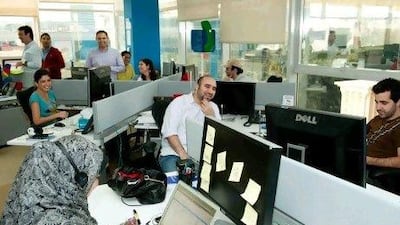Google has doubled its workforce in the Middle East and North Africa (Mena) to about 50 people in a bid to increase its share of the region's growing online advertising spending.
The Mena region makes up less than 5 per cent of Google's advertising business worldwide but the number of Google searches has grown by 30 per cent, while the online advertising market expanded 118 per cent this year.
"What we've seen in Mena and the UAE in the last few years encourages us to invest more," said Carlo d'Asaro Biondo, the president of southern and eastern Europe, Middle East and Africa operations for Google.
"The workforce is only part of the investment. Yes, we have doubled our workforce in the last year, and we'll double it again in the coming year," he said. Apart from increasing the number of its employees in the region, Mr Biondo says Google is also looking to potentially set up operations in Saudi Arabia.
The search giant's current focus on the UAE can be explained by its highly developed ICT network, representing 67 per cent of the Mena region's US$180 million (Dh661.1m) online advertising market, according to Mohamad Mourad, Google's regional Gulf manager.
"The UAE specifically plays a very distinct role in the region," he said
"A large part of the advertising spend is pan-Arab, and a large part of that is managed in the UAE. So if you're talking revenues, most of the revenues of Mena are managed out of the UAE," he said.
The investment in networks by the UAE and Saudi Arabia has set them apart from their regional counterparts, according to Christopher Lowe, a Middle East and Africa telecommunications analyst for IDC.
"GCC states … have invested significantly in ICT infrastructure such as fibre-optic network, cross-border terrestrial networks, microwave backhaul and mobile technologies," he said. "Non GCC countries in the Middle East and North Africa have significantly lower GDP, some are affected by the Arab Spring and some have large geographical areas where high capital investment is required, making it difficult to invest in ICT infrastructure," he said.
Despite the digital disparity that exists in the region, Google says it is still committed to the entire region as it increasingly caters more for Arabic speakers.
Mr Biondo said his company has already adapted products such as Google+ and Maps to be in Arabic, while Arabic-indexed sites had increased from 1 per cent last year to 1.5 per cent this year.
"It's the part of the world that has had very significant growth in terms of society, culture, economy in the last 50 years and represents more and more to the world," he said.

